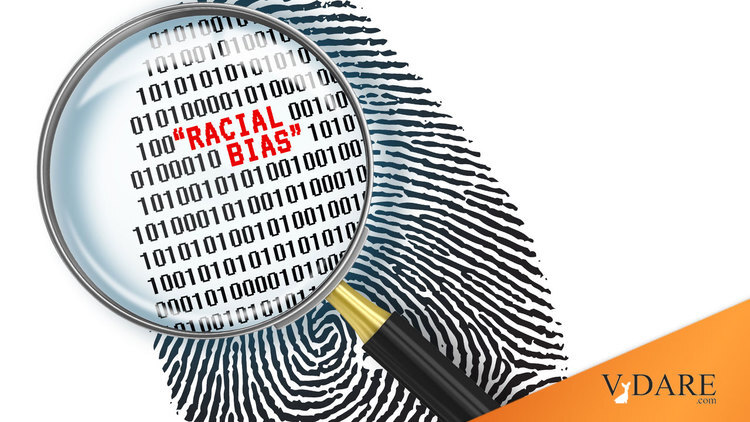
By Steve Sailer
10/16/2015
From the NYT’s Upshot section:
Police Killings of Blacks: What the Data Says OCT. 16, 2015But, considerably lower than the 52% of homicide offenders who were black over the years 1980-2008 according to a a 2011 Obama Administration report.Tamir Rice. Eric Garner. Walter Scott. Michael Brown. Each killing raises a disturbing question: Would any of these people have been killed by police officers if they had been white?
… As an economist who has studied racial discrimination, I’ve begun to look at these deaths from a different angle. There is ample statistical evidence of large and persistent racial bias in other areas — from labor markets to online retail markets. So I expected that police prejudice would be a major factor in accounting for the killings of African-Americans. But when I looked at the numbers, that’s not exactly what I found.
I’m not saying that the police in these specific cases are free of racial bias. I can’t answer that question. But what the data does suggest is that eliminating the biases of all police officers would do little to materially reduce the total number of African-American killings. Police bias may well be a significant problem, but in accounting for why some of these encounters turn into killings, it is swamped by other, bigger problems that plague our society, our economy and our criminal justice system.
To understand how this can be, let us start with the statistics on police killings. According to the F.B.I.’s Supplementary Homicide Report, 31.8 percent of people shot by the police were African-American, a proportion more than two and a half times the 13.2 percent of African-Americans in the general population.
Instead, there is another possibility: It is simply that — for reasons that may well include police bias — African-Americans have a very large number of encounters with police officers. Every police encounter contains a risk: The officer might be poorly trained, might act with malice or simply make a mistake, and civilians might do something that is perceived as a threat. The omnipresence of guns exaggerates all these risks.The real question is why the black % of total victims of police killings is that low (32%), much lower than the black % of people who commit homicides (52%), for example.Such risks exist for people of any race — after all, many people killed by police officers were not black. But having more encounters with police officers, even with officers entirely free of racial bias, can create a greater risk of a fatal shooting.
Arrest data lets us measure this possibility. For the entire country, 28.9 percent of arrestees were African-American. This number is not very different from the 31.8 percent of police-shooting victims who were African-Americans. If police discrimination were a big factor in the actual killings, we would have expected a larger gap between the arrest rate and the police-killing rate.
My impression is that suicide-by-cop is much more a white thing than a black thing, so a lot of police killings are of suicidal white guys, which reduces the black share of total victims of cops. A couple of months ago right on Ventura Boulevard there was a classic suicide by cop: a 40-something white homeless guy sat down on the sidewalk and fired a gun into the air and into the ground (making no effort to hit any pedestrians) until the LAPD came and killed him. So, this higher white suicide-by-cop propensity is one reason why the black proportion of those being killed by cops isn’t much higher than their arrest rates, when blacks tend on average to behave worse in most hostile situations.
This in turn suggests that removing police racial bias will have little effect on the killing rate. …If the major problem is then that African-Americans have so many more encounters with police, we must ask why. Of course, with this as well, police prejudice may be playing a role. After all, police officers decide whom to stop or arrest.
But this is too large a problem to pin on individual officers.
First, the police are at least in part guided by suspect descriptions. And the descriptions provided by victims already show a large racial gap: Nearly 30 percent of reported offenders were black. So if the police simply stopped suspects at a rate matching these descriptions, African-Americans would be encountering police at a rate close to both the arrest and the killing rates.
Second, the choice of where to police is mostly not up to individual officers. And police officers tend to be most active in poor neighborhoods, and African-Americans disproportionately live in poverty.
In fact, the deeper you look, the more it appears that the race problem revealed by the statistics reflects a larger problem: the structure of our society, our laws and policies.
The war on drugs illustrates this kind of racial bias. African-Americans are only slightly more likely to use drugs than whites. Yet, they are more than twice as likely to be arrested on drug-related charges. One reason is that drug sellers are being targeted more heavily than users.
We should eliminate police prejudice because it is wrong and because it undermines our democracy. It blights — and all too often destroys — lives.
But there are also structural problems underpinning these killings. We are all responsible for those.
Except for blacks, like Michael Brown. They’re not responsible for anything.
This is a content archive of VDARE.com, which Letitia James forced off of the Internet using lawfare.